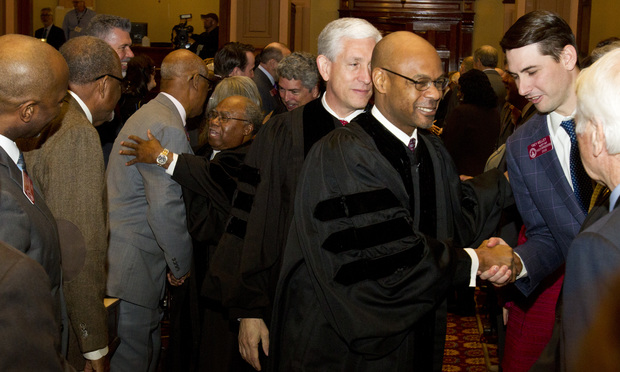Straight Talk About a Judicial 'Dirty Secret': Chief Justice Calls for Mental Health Measures
"Our own dirty secret is that the job of dealing with society's problems, in addition to our own, sometimes takes its toll. We are often not healthy ourselves," Georgia Supreme Court Chief Justice Harold Melton said to judges, legislators and state officials gathered at the Capitol.
February 26, 2020 at 03:43 PM
7 minute read
 Georgia Supreme Court Chief Justice Harold Melton, followed by Presiding Justice David Nahmias and Justice Robert Benham along with the other justices, is greeted by Georgia lawmakers before the State of the Judiciary. (Photo: John Disney/ALM)
Georgia Supreme Court Chief Justice Harold Melton, followed by Presiding Justice David Nahmias and Justice Robert Benham along with the other justices, is greeted by Georgia lawmakers before the State of the Judiciary. (Photo: John Disney/ALM)
A "dirty secret" inside the legal profession came up at the Capitol Wednesday.
Georgia Supreme Court Chief Justice Harold Melton put the spotlight on mental health concerns—even inside his own ranks—in the annual State of the Judiciary address to a joint session of the Georgia General Assembly in the House Chamber.
Melton applauded the lawmakers and Gov. Brian Kemp for creating a behavioral health commission to identify conditions that lead people into the criminal justice system to a disproportionate extent—sometimes repeatedly.
"The work of this commission is the next logical step as we strive to work unceasingly to improve our criminal justice system," Melton said. "We know that people with mental illnesses and co-occurring substance use disorders are over-represented in our jails."
Melton used the city of Macon in Bibb County as an example. He said 18% of the jail population is made up of people with a serious mental health diagnosis, compared to 5% of the general population. "Those with a mental health diagnosis stay in jail nearly twice as long and have nearly three times the recidivism rate," Melton said.
Melton said judges are responding to the need.
"In just five years, the number of participants served by Georgia's mental health courts has more than doubled, from 896 participants in 2014 to 2,112 participants in 2019," Melton said. "Under our judges' leadership, mental health courts have reduced recidivism and saved taxpayers' dollars. For every one dollar invested in a mental health court in Georgia, there is a savings of six dollars and three cents."
But the problem reaches both sides of the bench, he said.
"In addition to dealing with the behavioral health of people coming into our criminal justice system, I am also concerned about the mental health of our judges and lawyers," Melton said. "Our own dirty secret is that the job of dealing with society's problems, in addition to our own, sometimes takes its toll. We are often not healthy ourselves."
Melton commended the State Bar of Georgia and law schools for reaching out with confidential services and counseling related to depression, stress, alcohol and drug abuse. "Mental health issues affect us all, either directly or indirectly," Melton said.
In April, the Chief Justice's Commission on Professionalism will convene a suicide awareness program, Melton said.
"It will be a statewide conversation among our entire legal community," Melton said. He said King & Spalding partner and former acting U.S. attorney general Sally Quillian Yates, who lost her father to suicide, will moderate the program.
"We in the appellate courts were hit particularly hard this past year with the loss of one of our own—Judge Stephen Goss of the Court of Appeals, who died from suicide," Melton said, his voice vibrating with emotion. "Ironically, Judge Goss founded the state's first felony mental health court in Dougherty County in 2002."
The tragedy "reminds us that we cannot assume we always know what is going on in the personal lives of others," Melton said.
"It reminds us how important it is to reach out and care for one another, and learn specific ways we can respond to people we suspect might be considering taking their own lives," Melton said. "It also reminds us that we as a society still struggle to lift the stigma of mental illness that stands as a barrier preventing so many from getting the help they need."
Georgia's chief justice uses the annual address to highlight the progress and challenges of the courts. Melton followed up on access-to-justice concerns that now-retired Chief Justice Hugh Thompson raised six years ago.
Thompson pronounced that Georgia's judicial system was "sound" and "strong," then he added, "for those who can afford a lawyer," Melton said. "Too many of our citizens cannot afford legal representation in civil matters. Our economy has continued to improve. Georgia's poverty rate has dropped to 14.3%, but it remains higher than the United States average, according to the U.S. Census Bureau. Today, more than 1½ million Georgians live below the poverty level, defined as a family of four that earns no more than $26,200 per year. But even those of middle-income have difficulty affording lawyers. And as Chief Justice Thompson pointed out, they too encounter numerous legal problems."
Thomas also noted a number of rural Georgia counties that have no lawyers of any kind. Much research and discussion has followed since Thompson's speech—most of it pointing toward helping those who must proceed pro se to be better prepared and more successful.
Melton highlighted the potential for help in court law libraries. He said they are now rarely used by lawyers—who have the resources they need online at their fingertips. He took note of successful library programs in Atlanta's Fulton County and Albany's Daugherty County.
"As head of Georgia's judicial branch, I am asking my colleague, Justice Charlie Bethel, along with Fulton County Superior Court Judge Robert McBurney, to lead an ad hoc committee that will explore and promote best practices for refashioning law libraries across the state to meet today's needs," Melton said. "Self-help resource centers such as those in Fulton and Dougherty counties have the potential to embody the new role of Georgia's law libraries: a place where citizens will gain greater access to our legal system."
As judges and justices walked toward the Gold Dome to attend the speech, they approached from a new direction. Rather than walking across the street from their old quarters, they strode up Capitol Avenue from the new $131 million Nathan Deal Judicial Center, just dedicated this month. Melton opened with that image.
"Each day that I go to work, from whatever angle I approach, I am struck by the majesty of the first state building in Georgia's history dedicated solely to the judiciary," Melton said.
He added a note of deference to his audience. "Once I get to my office, I am struck by the view out my window—a view that appropriately looks upward with respect toward the equally majestic state Capitol building," Melton said.
Melton closed with gratitude and words that might bring to mind a State of the Union address.
"Thank you for the partnership and cooperation we have with you for the cause of justice," Melton said. "It is an honor to serve with each one of you as we work together to hammer out these tough but meaningful issues. God bless you all, and God bless the great state of Georgia."
Related story
Burnout on the Bench: Judges Grapple With Stress Fatigue
This content has been archived. It is available through our partners, LexisNexis® and Bloomberg Law.
To view this content, please continue to their sites.
Not a Lexis Subscriber?
Subscribe Now
Not a Bloomberg Law Subscriber?
Subscribe Now
NOT FOR REPRINT
© 2025 ALM Global, LLC, All Rights Reserved. Request academic re-use from www.copyright.com. All other uses, submit a request to [email protected]. For more information visit Asset & Logo Licensing.
You Might Like
View All
Georgia Republicans Push to Limit Lawsuits. But Would That Keep Insurance Rates From Rising?
5 minute read
A Plan Is Brewing to Limit Big-Dollar Suits in Georgia—and Lawyers Have Mixed Feelings
10 minute readTrending Stories
- 128 Firms Supporting Retired Barnes & Thornburg Litigator in Georgia Supreme Court Malpractice Case
- 2Boosting Litigation and Employee Benefits Practices, Two Am Law 100 Firms Grow in Pittsburgh
- 3EMT Qualifies as 'Health Care Provider' Under Whistleblower Act, State Appellate Court Rules
- 4Bar Report - Feb. 3
- 5Was $1.3M in 'Incentive' Payments Commission? NJ Justices Weigh Arguments
Who Got The Work
J. Brugh Lower of Gibbons has entered an appearance for industrial equipment supplier Devco Corporation in a pending trademark infringement lawsuit. The suit, accusing the defendant of selling knock-off Graco products, was filed Dec. 18 in New Jersey District Court by Rivkin Radler on behalf of Graco Inc. and Graco Minnesota. The case, assigned to U.S. District Judge Zahid N. Quraishi, is 3:24-cv-11294, Graco Inc. et al v. Devco Corporation.
Who Got The Work
Rebecca Maller-Stein and Kent A. Yalowitz of Arnold & Porter Kaye Scholer have entered their appearances for Hanaco Venture Capital and its executives, Lior Prosor and David Frankel, in a pending securities lawsuit. The action, filed on Dec. 24 in New York Southern District Court by Zell, Aron & Co. on behalf of Goldeneye Advisors, accuses the defendants of negligently and fraudulently managing the plaintiff's $1 million investment. The case, assigned to U.S. District Judge Vernon S. Broderick, is 1:24-cv-09918, Goldeneye Advisors, LLC v. Hanaco Venture Capital, Ltd. et al.
Who Got The Work
Attorneys from A&O Shearman has stepped in as defense counsel for Toronto-Dominion Bank and other defendants in a pending securities class action. The suit, filed Dec. 11 in New York Southern District Court by Bleichmar Fonti & Auld, accuses the defendants of concealing the bank's 'pervasive' deficiencies in regards to its compliance with the Bank Secrecy Act and the quality of its anti-money laundering controls. The case, assigned to U.S. District Judge Arun Subramanian, is 1:24-cv-09445, Gonzalez v. The Toronto-Dominion Bank et al.
Who Got The Work
Crown Castle International, a Pennsylvania company providing shared communications infrastructure, has turned to Luke D. Wolf of Gordon Rees Scully Mansukhani to fend off a pending breach-of-contract lawsuit. The court action, filed Nov. 25 in Michigan Eastern District Court by Hooper Hathaway PC on behalf of The Town Residences LLC, accuses Crown Castle of failing to transfer approximately $30,000 in utility payments from T-Mobile in breach of a roof-top lease and assignment agreement. The case, assigned to U.S. District Judge Susan K. Declercq, is 2:24-cv-13131, The Town Residences LLC v. T-Mobile US, Inc. et al.
Who Got The Work
Wilfred P. Coronato and Daniel M. Schwartz of McCarter & English have stepped in as defense counsel to Electrolux Home Products Inc. in a pending product liability lawsuit. The court action, filed Nov. 26 in New York Eastern District Court by Poulos Lopiccolo PC and Nagel Rice LLP on behalf of David Stern, alleges that the defendant's refrigerators’ drawers and shelving repeatedly break and fall apart within months after purchase. The case, assigned to U.S. District Judge Joan M. Azrack, is 2:24-cv-08204, Stern v. Electrolux Home Products, Inc.
Featured Firms
Law Offices of Gary Martin Hays & Associates, P.C.
(470) 294-1674
Law Offices of Mark E. Salomone
(857) 444-6468
Smith & Hassler
(713) 739-1250








